July 20, 2020
Assistance for Measures to Combat COVID-19 under the Project for Strengthening the Water Service Management of Pyanj and Khamadoni Vodokanals
In response to a request by the Government of Tajikistan, JICA provided assistance for the procurement of a chlorine agent (bleaching powder) used by the state affiliated enterprises on water supply and sewerage (Vodokanals) throughout Tajikistan to enable the continued supply of disinfected safe water. Safe water is indispensable to ensure regular hand washing which is a basic measure to fight the new coronavirus. This assistance benefits some 1.05 million people of Tajikistan.
Tajikistan is a small inland country located in the south-eastern part of Central Asia with a population of 9.3 million and an area of 144,100 km2, equivalent to some 40% of that of Japan. Following an increasing number of new coronavirus (COVID-19) infections in neighbouring countries in March, the first case in Tajikistan was reported at the end of April. The infection rapidly spread, peaking in May with more than 400 new cases being reported in a single day. Although the number of new cases has since fallen, some 50 new cases a day are still being reported. As of 20th July, the total number of cases stands at 6,878 with 57 deaths.
Like many other countries, the Government of Tajikistan has imposed such control measures as limitations on inbound flights and two weeks quarantine for anyone entering the country, regardless of nationality. The government has requested that certain types of workplaces voluntarily suspend their businesses, restricted gatherings of people and made the wearing of a face mask compulsory in public spaces with a fine of 25 somoni (TJS) (approximately 2,500 JPY) for an offender. Other measures include priority budget allocation for the health care sector and the disinfection of streets. However, the scale of these measures has been inadequate as the country's essentially difficult fiscal conditions have been further squeezed by COVID-19 related expenditure.
JICA is currently implementing the "Project for Strengthening the Water Service Management of Pyanj and Khamadoni Vodokanals" as a technical cooperation project in the water resources sector. The counterpart agency for this project is the state unitary enterprise "Khojagii Manziliyu-Kommunali" (KMK) which manages water supply and sewerage services throughout Tajikistan and the project assists the building of the managerial capacity, including the O&M of water supply facilities and business management of Vodokanals in the two districts. Guidance of the disinfection (chlorination) of raw water is an important activity of the project to ensure the supply of safe water which is an effective measure in the fight against COVID-19. However, the chlorine originally scheduled for use for water disinfection has been urgently diverted to the health care sector, making it difficult to secure a supply of chlorine agent for the water supply sector. To make matters words, the spread of COVID-19 has reduced the revenue from water supply service, worsening the financial situation of KMK. This means that Vodokanals throughout Tajikistan are finding it difficult to procure a sufficient volume of bleaching powder for the disinfection of water.
Under these circumstances, the project decided to provide 300 tons of bleaching powder in response to a request made by KMK. Preliminary checking of the inventory level of bleaching powder at KMK found that the nationwide inventory level at Vodokanals was less than one month's supply, prompting JICA's urgent procurement of 35 tons of bleaching powder for handing over to the KMK.
This quick response was achieved in as short a time as two weeks from the original decision to provide bleaching powder and is one of the fastest assistance measures to respond to a request by the Government of Tajikistan in the fight against COVID-19 among the various measures of donors and international aid organizations. This rapid response has helped to avoid the worst possible situation of the supply of water without disinfection due to the lack of bleaching powder in stock. The further procurement of high quality Russian and/or Iranian bleaching powder is scheduled to take place in several batches, following the first procurement of 35 tons. The inventory control of the newly procured bleaching powder and its delivery to Vodokanals throughout the country are conducted by the JICA Tajikistan Office, local staff for the project and volunteers of the Aga Khan Foundation.
Like the Japanese, the people of Tajikistan are great tea drinkers. Because of this, they are quite sensitive to the taste of water and complain when the supplied water has a smell of chlorine due to a relatively high level of chlorine used to disinfect water. In recent years, there has been a growing preference for "tasty water" in Japan and efforts have been made to keep the residual chlorine concentration of the supplied water as low as possible. The importance of technical guidance regarding chlorination under JICA's technical cooperation project has also been increasing in Tajikistan to respond to the request of water users for not only safe but also tasty water.
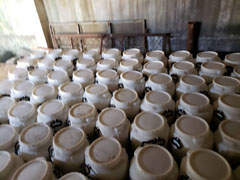
Procured high quality bleaching powder
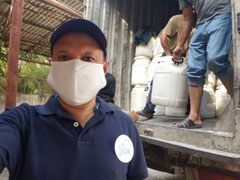
Local staff engaged in the inventory and delivery control of bleaching powder
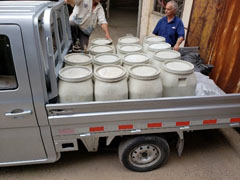
Containers of bleaching powder are delivered to Vodokanals throughout Tajikistan
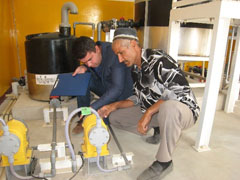
Guidance on the operational control of chlorine injection
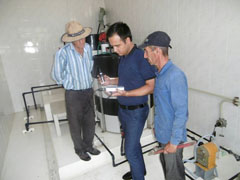
Measurement of the residual chlorine concentration
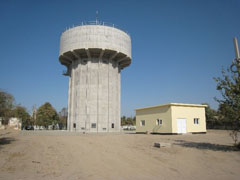
Elevated water tank constructed under a Japan's grant aid project
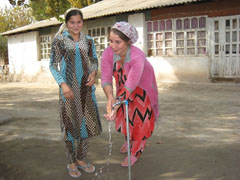
Supply of safe water




scroll